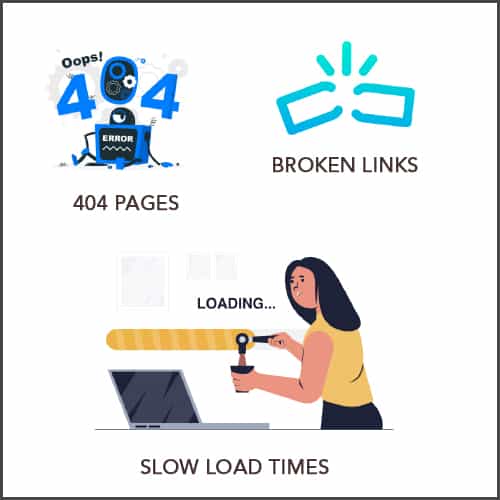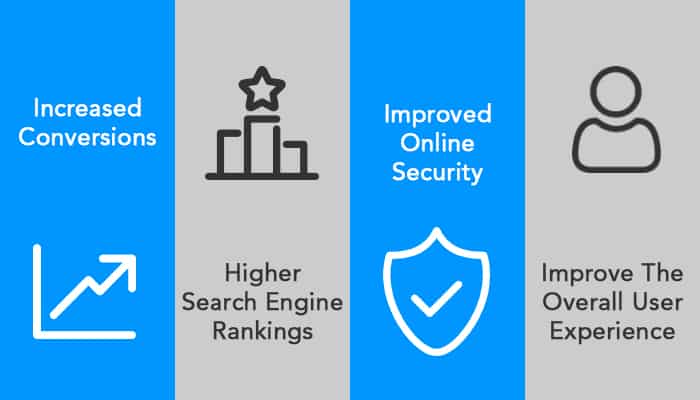You probably don’t think much about search engine optimization unless you’re a marketing pro, but it may be time to take notice. SEO is crucial for your website’s success and can have a huge impact on your business as a whole.
You need to invest in an SEO audit if you want to increase the rankings of your site and improve conversion rates.
Want to learn more about SEO audits? Then this blog post is just for you!
Table of Contents
What’s an SEO Audit?
An SEO audit is a comprehensive checkup of your website’s health, usually done by an expert with 3 or more years experience. It includes tasks such as evaluating the on-page optimization of your web pages and checking for any issues with off-page optimization signals like backlinks and brand mentions.
What’s the purpose of an SEO Audit?
An SEO audit enables you to improve your site’s rankings by taking action on the findings presented to you. It also helps optimize the content on your pages so that search engines can better understand what they are all about to properly display them in search results. Get one now:
Reasons You Should be Doing Regular SEO Audits
Here’s some of the top reasons to do regular website audits:
- Verify you’re doing everything possible for your website’s success.
- Ensure your site is fully optimized and compliant with Google guidelines. If there are issues, catch it early before ranking suffers.
- Identify content that’s good and pages needing work. A Website is never finished!
- Got spammy links pointing at your website? A good SEO team will know when it causes damage.
- Or when the ‘spam’ is actually helping you…
- Testing shows that’s often the case but, don’t tell big G I said it 🙏 🤫
- Help identify new content opportunities that are SEO friendly.

How Often Should You Conduct an SEO Audit?
There’s no set rules about how often an SEO audit should be done. A good rule of thumb in my experience is to schedule yours quarterly, but you should do it more often if there are any significant changes being made that could bring about the dreaded Google Dance that often plagues newly redesigned websites.

What Should You Look for When Conducting the Audit?
The first thing you need to do is to check for technical SEO issues such as broken links, 404 pages, slow load times, or layout shift. Make sure that your website is loaded properly on different browsers, operating systems, and devices so you can address any compatibility issues early on.

Then, look at the content of your web pages and see what needs to be improved or removed since outdated or irrelevant pages can impact your site’s performance.
The Benefits of an SEO Audit
There are many benefits to conducting regular audits – including increased conversions, higher search engine rankings, and improved online security. The most significant benefit is that you will be able to improve the overall user experience on your website by identifying any technical issues early on before they affect your website’s performance.

Knowing what to look for and how often SEO audits should be conducted is a great start, but you’ll need the help of an expert who knows exactly what they’re doing. A reliable digital marketing agency will not only conduct thorough SEO audits on a regular basis but also help you understand and interpret the audit results.
Many tools used in SEO audits will identify false positives and if you implement the suggestions from those tools without context, you might do more harm than good.

Who Can Conduct an SEO Audit?
There are many digital marketing agencies that can conduct comprehensive audits, but there are also ways you can do it yourself if you have the time, talent and resources.
If you’d like to take a stab at doing an SEO audit on your own, here’s a few suggestions help you succeed:
- Use an application that will crawl your website just like a search engine would. There are a couple of free applications that you can take advantage of. One respected tool that’s been around forever is Screaming Frog. It makes identifying redirects, URL issues, duplicate pages, and many more technical SEO issues easy.

- Verify your website on Google Search Console. It’s free! Websites that have verified ownerships have access to a myriad of tools straight from big G. By using the free tools in GSC you’ll get access to a lot of information that Google’s looking at when they evaluate your website.
- Make use of Google Analytics. Google Analytics is a very powerful tool that provides meaningful data about which pages are performing well and what type of content your users like to read the most. It’s also a good starting point as it shows the many sources where visitors are finding your website.
- Try a Google advanced search operator. One of the most useful ones is the command – site:yoururl.com where yoururl is your website address you want to take a look at. This will reveal all the pages Google indexes your site for. If there’s pages that have no value to your users, take action to get those removed from the index.
How Long Does an SEO Audit Take?
A regular SEO audit can take anywhere from a couple of hours up to a day or two depending on the size of your site. No one tool is perfect, so it’s important to pull data from as many sources as possible to get the complete picture.
Conclusion
Performing an SEO audit can be hard work, but it’s necessary to rank higher on search engines and maintain those good rankings over time. A detailed audit can also uncover ways to improve user experience and conversions at the same time.
Are you looking for help auditing your website? For the most thorough audit, work with an agency that manages multiple SEO projects. That way, you’ll have access to all the latest tools and the knowledge that comes from tracking multiple websites as they progress to the top of Google search results.
Webology offers a free initial website audit, so be sure to sign up today and see what’s holding your website back.








